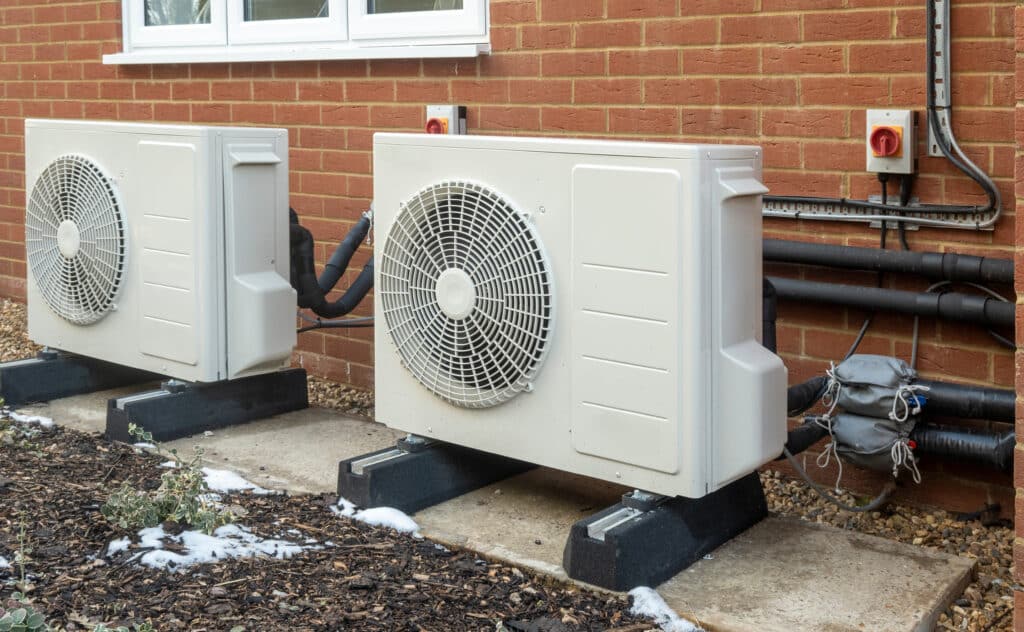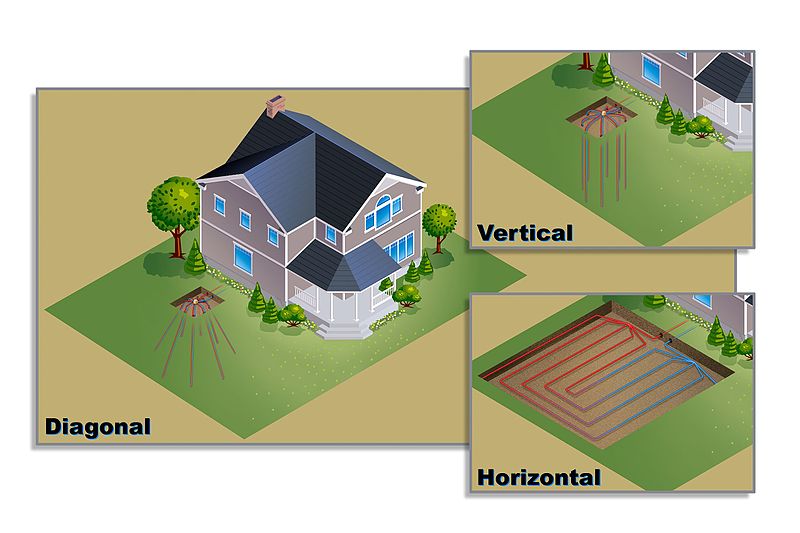Beat the Connecticut heat with Home Comfort Practice! Spotlight on heat pumps: the AC game-changer!
Cooling Systems, Compared
At Home Comfort Practice, we're all about keeping Connecticut cool! Dive into our deep dive on air conditioning systems, with heat pumps taking center stage. Compare them to MiniSplits, Ductless Split Systems, and Central ACs. Let's compare them to MiniSplits, Ductless Split Systems, Central ACs and more. Discover the cool difference heat pumps can make!
Heat pumps cool by reversing their typical heating operation. Instead of extracting heat from the outside and bringing it indoors, they take indoor heat and release it outside. This process uses a component called a reversing valve, which switches the direction of the refrigerant flow. The beauty of this system is that it moves heat rather than generating it, making it inherently efficient. In climates like Connecticut's, where summers can be warm but not excessively hot, heat pumps can cool homes using less energy than traditional air conditioners, leading to potential savings on electricity bills.
There are several types of heat pumps, including air-source, ground-source (or geothermal), and ductless mini-splits. For cooling in Connecticut's climate, air-source heat pumps are commonly used, as they exchange heat with the outside air. Ground-source heat pumps, which exchange heat with the ground, can also be highly efficient for cooling since the earth's temperature remains relatively stable. Ductless mini-splits, which are a type of air-source heat pump, offer zoned cooling, allowing different rooms or areas to be cooled to different temperatures. Given Connecticut's moderate summers, all these types can provide efficient cooling, but the choice often depends on the specific needs of the household and the property's characteristics.
Heat pumps, in their cooling mode, are champions of energy efficiency. They reduce the need for electricity by leveraging the ambient temperature differences, leading to lower energy consumption. This not only translates to potential savings on energy bills but also means a reduced carbon footprint. Connecticut's push towards sustainable energy solutions and the availability of rebates and incentives for energy-efficient technologies make heat pumps an even more attractive option. Residents can enjoy effective cooling while knowing they're making a choice that's good for both their wallets and the planet.
Heat Pumps vs other Air Conditioners
Central air conditioners use a split system with an indoor evaporator coil and an outdoor condenser unit to cool homes. They rely on refrigerants to absorb indoor heat and release it outside. They achieve efficiencies as high as 98.5%, converting nearly all the fuel to useful heat. Heat pumps, however, can both cool and heat by reversing their operation. In Connecticut, with its cold winters and warm summers, heat pumps can handle both tasks, potentially reducing installation and operational costs. Additionally, heat pumps can be more energy-efficient, especially during milder seasons, leading to potential savings. For Connecticut residents, heat pumps also align with energy rebates, making them a cost-effective choice.
Mini-splits are ductless systems that provide cooling to specific zones. They consist of an outdoor compressor unit and an indoor air handler. While they're efficient and flexible, not all mini-splits provide heating. Heat pumps, especially in their mini-split form, can both cool and heat, making them ideal for Connecticut's fluctuating temperatures. The ability of heat pumps to reverse their operation means they can extract ambient warmth even in colder conditions, providing efficient heating. This adaptability, combined with potential energy rebates in Connecticut, makes heat pumps a compelling choice.
Multi-split air conditioners connect multiple indoor units to an outdoor unit, offering zoned cooling. They allow for independent temperature control in different zones. However, their primary function is cooling. Heat pumps, in a similar multi-split configuration, can provide both heating and cooling. This means a single system can cater to both winter and summer needs in Connecticut. The ability of heat pumps to utilize ambient temperature changes, even when it's cold outside, ensures consistent comfort throughout the year, making them a top choice for Connecticut's climate.
Window air conditioners are compact units designed for single rooms. They operate using a closed refrigeration cycle. While they're convenient for spot cooling, they don't offer the comprehensive heating and cooling solution that heat pumps do. Heat pumps can serve entire homes, adapting to both cool and heat, making them a comprehensive solution for Connecticut's diverse weather conditions. Their ability to provide consistent comfort, regardless of the season, and potential for energy savings make them a preferred choice for many Connecticut homes.
Portable air conditioners can be moved from room to room, venting hot air through a window. While they offer placement flexibility, their cooling capacity can be limited. Heat pumps, adaptable to both cooling and heating, often operate with higher efficiency. Especially in Connecticut, where energy conservation is a priority, heat pumps offer a more sustainable and efficient heating solution. They can work in reverse during winter, ensuring warmth, and are often supported by energy rebates, enhancing their cost-effectiveness.
Evaporative coolers, or swamp coolers, cool by passing air over water-saturated pads, which can increase indoor humidity. In Connecticut's humid climate, this might be less effective. Heat pumps, on the other hand, provide effective cooling without adding humidity, making them a more suitable choice for the state's climate. Their ability to provide both heating and cooling further enhances their suitability for the state's varied temperatures.
Heat Pump Air Conditioning Rebates
-
Air Source Heat Pump Cooling Systems: The Energize CT program offers a rebate of $1,250 per ton, with costs typically between $5,000 and $25,000. Depending on the size, rebates can reach up to $15,000, leading to potential lifetime savings of about $15,000.
-
Ground Source Heat Pump Cooling Systems: These come with a $1,250 per ton rebate. Costs range from $17,000 to $34,000, with a maximum rebate of $15,000 and potential lifetime savings of approximately $50,000.
Since heat pumps both cool and heat, these rebates make year-round whole-home comfort significantly more affordable.
| Energize CT Rebate: $1250 per Ton | |
|---|---|
| Avg. Initial Cost | $5000-$25000 |
| Max Rebate | $15000 |
| Avg. Lifetime Savings | $15000 |
Claim up to $15,000 combined incentives for qualifying air source heat pumps. Energize CT heat pump rebates are based on equipment size (tonnage).
| Energize CT Rebate: $1250 per Ton | |
|---|---|
| Avg. Initial Cost | $17000-$34000 |
| Max Rebate | $15000 |
| Avg. Lifetime Savings | $50000 |
Claim up to $15,000 in Energize CT ground source heat pump rebates for qualifying equipment.
The Inflation Reduction Act IRA Electrification Rebate extends up to $8,000 for these heat pump cooling systems(that also double as heating!) . Typically, the initial cost for such systems in Connecticut can range between $8,000 and up to $35,000. Depending on a household's income, the rebate can offset 50% to 100% of these costs.
| IRA Electrification Rebate: $8000 | |
|---|---|
| Upfront Discount | 50%-100% of Costs |
| Avg. Initial Cost | $8000-$35000 |
Claim up to $8,000 in Inflation Reduction Act rebates for heat pump air conditioner/heater systems. Low-income households with incomes that are below 80 percent of the Area Median Income (AMI) are eligible to receive 100 percent coverage of their heat pump costs up to $8,000. Moderate-income households with incomes between 80 percent and 150 percent of the AMI are eligible to receive 50 percent coverage of their heat pump costs up to $8,000.
| IRA Electrification Rebate: Uncapped | |
|---|---|
| Upfront Discount | 50%-100% of Costs |
| Avg. Initial Cost | $17000-$34000 |
-
Heat Pump Cooling Systems: The IRA's 25C tax credit allows homeowners to claim 30% of costs, capped at $2,000 annually.
-
Ground Source Heat Pumps: Under the IRA's Section 25D, homeowners receive a 30% tax credit for installing these pumps.
Qualify for Air Conditioning Rebates by Getting a Home Energy Audit Get Qualified for AC Rebates
$0
$0
Weatherization Service Value$0
Average Annual Energy Savings$0
Average 1st Year SavingsInstall. Repair. Replace. Maintain. HCP Offers a Full Range of HVAC Services. More HVAC Services
Air Conditioning
Learn More...
Heating
Learn More...
HVAC Rebates
Learn More...
Ductwork
Learn More...
Indoor Air Quality
Learn More...



